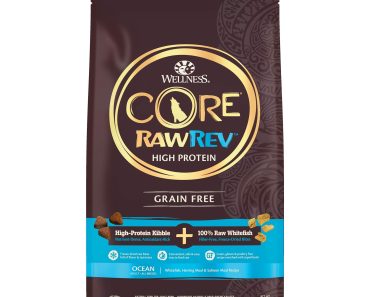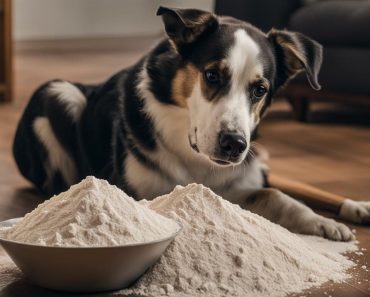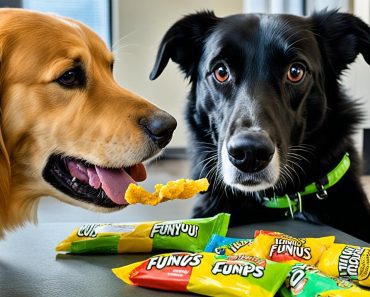As a dog owner, I’m sure you’ve wondered about the foods your furry friend can safely consume. One common ingredient found in many human snacks and pet food is corn starch. But can dogs eat corn starch? Let’s delve into the details and explore how corn starch fits into a dog’s diet.
Can Dogs Eat Corn Starch? Yes, they can, but in controlled amounts.
- Corn starch is safe for dogs to eat in moderation, but it shouldn’t be a major part of their diet.
- Overfeeding dogs with food containing corn starch can lead to weight gain and increased risk of heart disease and diabetes.
- Dogs with corn allergies should avoid food and treats made with corn starch.
- Consult with a veterinarian to determine the appropriate amount of corn starch for your dog’s diet.
- Ensure your dog’s diet is balanced and includes essential nutrients beyond corn starch.
Is Corn Starch Bad For Dogs?
While corn starch is generally safe for dogs to consume, it is important to be mindful of the risks associated with feeding them excessive amounts. Corn starch has low nutritional value and is high in carbohydrates, which can contribute to weight gain in dogs.
Overweight dogs are at a higher risk of developing heart disease and diabetes. Feeding them food containing corn starch in excess can increase the likelihood of these harmful effects. It is crucial to maintain a balanced diet for dogs that includes essential nutrients and to avoid overfeeding them with corn starch-laden foods.
If a dog consumes a large quantity of pure corn starch, it may lead to respiratory issues or stomach problems. This is why it is best to provide dogs with a diet that includes a variety of ingredients and nutrients, rather than relying heavily on corn starch as a source of nutrition.
Danger of Dogs Eating Plain Corn Starch
While corn starch is safe for dogs to consume in small amounts and as an ingredient in food or treats, it is not recommended to allow dogs to eat plain corn starch. This is because plain corn starch has low nutritional value and may cause digestive issues.
If a dog consumes a large quantity of corn starch, it could lead to respiratory irritation and stomach problems. Feeding dogs pure powdered corn starch is not advisable due to these potential health risks.
To ensure the safety of dogs consuming corn starch, it is best to include it in recipes or commercially prepared food made specifically for dogs. There are several dog-friendly corn starch recipes available, such as homemade dog biscuits or treats that incorporate corn starch as one of the ingredients.
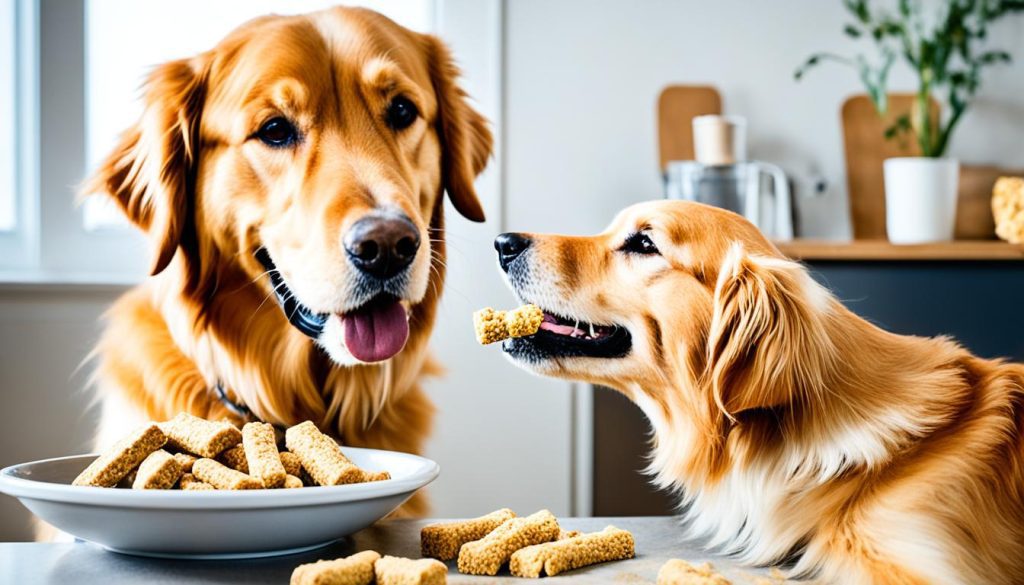
Dogs Eating Too Much Food Containing Corn Starch
Dogs that consume excessive amounts of food containing corn starch are at risk of weight gain, which can contribute to health issues such as heart disease and diabetes. While corn starch is a common ingredient in dog food and treats, it should not make up the majority of a dog’s diet. It is important to provide dogs with a balanced diet that includes proteins, essential vitamins, fiber, fatty acids, and minerals. When feeding dogs food or treats made with corn starch, it is crucial to monitor their intake and avoid overfeeding.
Feeding dogs excessive amounts of food containing corn starch can lead to weight gain. This can be a concern, as overweight dogs are more susceptible to developing heart disease and diabetes. To ensure the health and well-being of your dog, it is essential to provide them with a balanced diet that meets their nutritional needs. Corn starch should be used in moderation as part of a varied diet that includes high-quality proteins, essential vitamins, fiber, fatty acids, and minerals.
There are various ways to incorporate corn starch into your dog’s diet without overfeeding. Dog-friendly corn starch recipes can be a great option. These recipes use corn starch in combination with other nutritious ingredients to create tasty and healthy treats for your furry friend. By following these recipes and monitoring portion sizes, you can ensure that your dog enjoys the benefits of corn starch without the risk of overconsumption.
Benefits of Dog-Friendly Corn Starch Recipes:
- Provides a source of energy
- Helps with food texture and palatability
- Can be used as a thickener in homemade dog food
- Allows for a variety of flavors and textures in treats
To get you started, here is a simple dog-friendly corn starch recipe:
Homemade Peanut Butter and Corn Starch Dog Treats
- Ingredients:
- 1 cup oat flour
- 1/4 cup natural peanut butter
- 1 tablespoon honey
- 1 tablespoon corn starch
- Preheat the oven to 350°F (175°C).
- In a mixing bowl, combine the oat flour, peanut butter, honey, and corn starch.
- Mix well until all the ingredients are thoroughly combined.
- Roll the dough into small balls and place them on a baking sheet lined with parchment paper.
- Flatten each ball with a fork, creating a crisscross pattern.
- Bake for 12-15 minutes or until the treats are golden brown.
- Allow the treats to cool completely before serving.
These homemade treats are a delicious and nutritious option for rewarding your dog. Remember to always consult with your veterinarian before introducing any new food or treats into your dog’s diet.
By being mindful of your dog’s corn starch intake and incorporating it into a balanced diet, you can ensure that your furry friend stays healthy and happy.
Avoid Human Food Made with Corn Starch
Sharing human foods made with corn starch with dogs is not recommended. Corn starch is commonly used in human snacks and baked goods, which may contain high amounts of starch, calories, or sugars. Consuming food made with corn starch can have harmful effects on dogs, including unhealthy spikes in their blood sugar levels, increasing the risk of diabetes.
Additionally, some dogs may have allergies to corn or corn starch, leading to adverse reactions. To prioritize the safety and well-being of dogs, it is best to avoid sharing human food made with corn starch and instead opt for dog-specific treats and snacks.
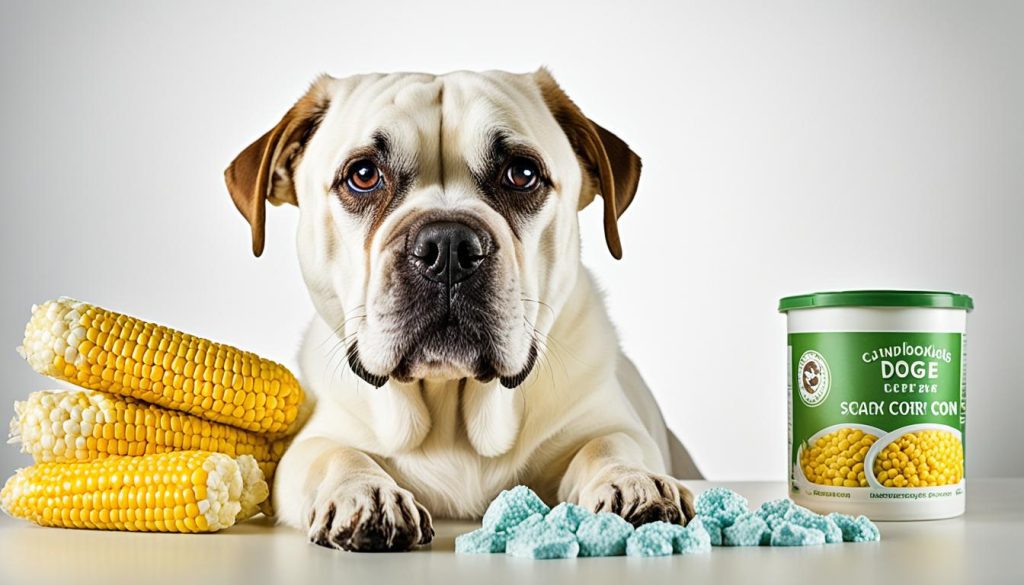
Dogs With Corn Allergies
Some dogs may have allergies to corn or corn starch. If your dog has been diagnosed with a corn allergy, it is important to remove all dog food and treats that contain corn starch from their diet. Feeding corn starch to dogs with corn allergies can lead to adverse reactions and discomfort.
Instead of using corn starch, consider incorporating cornstarch alternatives into your dog’s diet. Oat flour can be an excellent substitute for corn starch in dog-friendly recipes. Additionally, foods made with rice, potato starch, or tapioca starch can provide similar functionality without triggering allergic reactions.
Consulting with a veterinarian is crucial when managing and accommodating a dog with corn allergies. They can provide guidance on suitable alternatives and help you create dog-friendly corn starch recipes using safe ingredients for your furry friend.
Conclusion
After evaluating the safety and implications of dogs consuming corn starch, it can be concluded that corn starch is generally safe for dogs when consumed in moderation. It is commonly found in dog food and treats due to its low cost and digestibility. However, it is crucial to be mindful of the quantity of corn starch being fed to dogs, as excessive amounts can lead to weight gain and potential health issues.
To ensure the well-being of dogs, it is necessary to provide them with a balanced diet that includes essential nutrients. Monitoring the intake of corn starch is important, especially for dogs prone to weight gain or those with specific dietary restrictions. In cases where a dog has allergies to corn or corn starch, it is advisable to avoid feeding them any products containing these ingredients, opting for suitable alternatives instead.
If you are looking for dog-friendly recipes that include corn starch, consult with a veterinarian or professional pet nutritionist to ensure the recipes meet your dog’s dietary needs. Their expertise will help you create delightful and safe treats for your furry friend.

